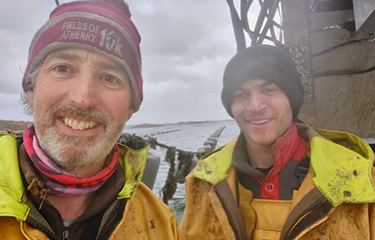A mussel farmer since 1983, Michael Mulloy is the owner of Blackshell Farm, which grows rope-grown mussels in Ireland’s Clew Bay. He also serves as the national aquaculture chair at the Irish Farmers Association, a lobbying group focused on promoting and protecting the country’s dairy, meat, and farmed seafood producers.
Ireland’s exports of farmed seafood totaled EUR 150 million (USD 163 million) in 2022, most of it from sales of oysters and salmon, but the country’s government has ambitions of realizing even more value from its aquaculture sector. However, expansion has been delayed by a botched licensing system that had to be rebuilt from scratch after the European Union in 2007 found it in contravention of its environmental regulations.
“The government wasn’t entitled to license in special areas of conservation,” Mulloy said. A stopgap arrangement between Dublin and Brussels allowed previously-granted licenses to remain in place while the Irish government established the Irish Marine to conduct environmental impact assessments, a laborious process that has taken nearly two decades.
Mulloy recently detailed to lawmakers at a hearing of the Irish parliament’s agriculture committee the difficulties shellfish farmers have faced in dealing with red tape around permitting and operational regulations.
“The licensing process has improved, but there remains a shortage of new licenses,” Mulloy said.
In the meantime, however, many companies lost access to E.U. funding from the E.U. common fisheries policy, which issues subsidies for capital expenditures on aquaculture facilities and marketing.
“Irish aquaculture product has stagnated in recent years,” Mulloy told members of the Dáil (Ireland’s parliament) and Senate. When they questioned as to why Ireland wasn’t producing more farmed seafood like countries such as Norway, Mulloy said the state had set unrealistic targets for increasing aquaculture production. A jumble of often contradicting policies and directives requires “consolidation” and a single coherent document guiding the seafood sector, Mulloy said.
One of the legislators, Padraic McLoughlin, representing the Atlantic coastal county of Donegal, questioned why Irish farmed seafood production was shrinking while output has grown in Iceland and Norway. In fact, the Irish figures are in line with those of other E.U. member-states, while Norway’s growth is slowing as new legislation on water quality brings E.U.-style regulatory oversight to fish farming. Irish finfish farming output has dropped by over 10 percent in volume tin the last decade, but oyster production has increased in that time. Globally, aquaculture output is growing at an average of 5 percent per year, with most of the growth in Asia, where there is a more-established tradition of aquaculture and, in many countries, laxer regulation.
By contrast, salmon farming is a divisive issue in Ireland. Bergen, Norway-based Mowi, the world’s biggest seafood company in revenue terms, operates several salmon farms in Irish waters and has submitted applications for several other licenses, a process that can take up to a decade.
Mulloy said aquaculture can offer a sustainable product and provide an economic lifeline to coastal communities while curbing pollution and mitigating some effects of climate change. But, according to Mulloy, Ireland’s industry is hindered by a licensing process far more strenuous than anything applied to terrestrial forms of cultivation, as the lobbying power of meat and dairy production is influencing the country’s political priorities.
“If you were to apply the same scrutiny to other forms of agriculture that is applied in aquaculture licensing, you would probably have a horror show,” Mulloy said. “Agriculture is not up for scrutiny. A lot of people don’t understand aquaculture, a lot of people don’t want to understand it. Politicians are always wary of it.”
Around 500 licenses for aquaculture activity have been issued in Ireland since 2016, some of them renewals and some of them new.
“But there remains a shortage of new licenses,” Mulloy said. “The process of application, decisions, and appeals can take years. The broader planning laws can’t keep up.”
With the elimination of red tape hindering the industry’s growth, Mulloy said he thinks the value of Irish aquaculture exports could be expanded this decade to EUR 500 million (USD 543 million).
“There are plenty of sites in Mayo. The key is that actual licensed areas are operating at potential,” he said.
There should be a mechanism to scrutinize and give feedback after three years, said Mulloy, a “use it or lose it” provision. Licenses are renewed every 10 years but, according to Mulloy, a “green certification” issued by Ireland’s Agriculture and Food Development Authority is required from new entrants to agriculture, and the creation of a similar “blue certification” would raise the bar in his industry, Mulloy believes.
“The fact is that anyone can apply for an aquaculture license regardless of experience or background,” he said.
Photo courtesy of Blackshell Farm







